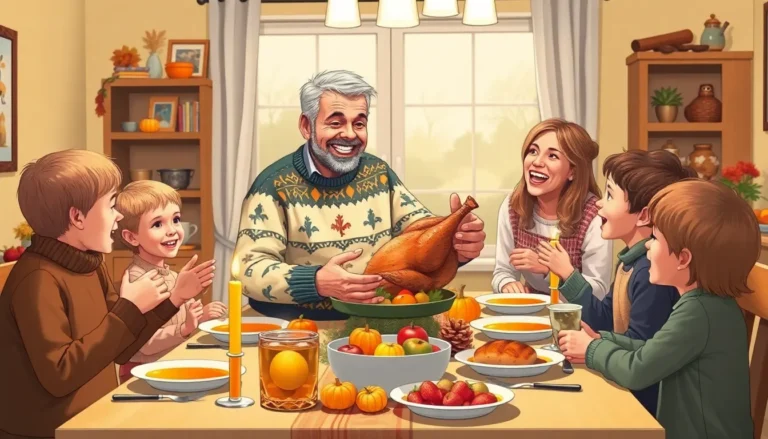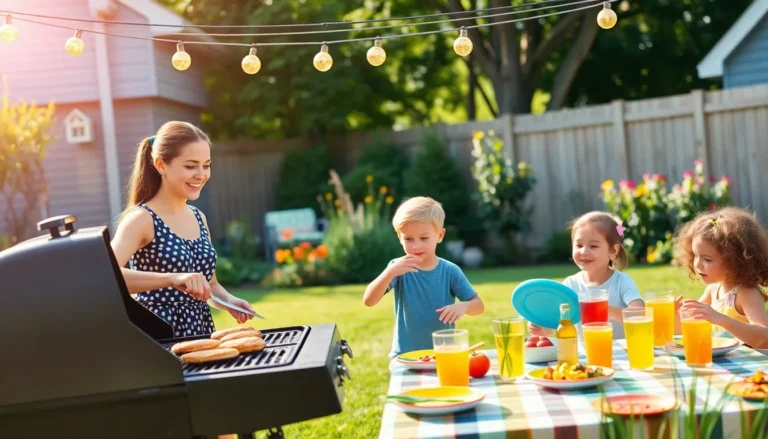When it comes to family traditions, Mexican culture knows how to throw a fiesta! From lively celebrations to mouthwatering feasts, these customs weave a vibrant tapestry that binds families together. Picture this: a warm kitchen filled with the aroma of tamales, laughter echoing as loved ones gather, and the occasional friendly debate over who makes the best salsa.
Table of Contents
ToggleOverview of Mexican Family Traditions
Mexican family traditions focus on the strength of familial bonds and community. Celebrations often include large gatherings, where relatives come together to share meals and stories. Family reunions frequently showcase traditional dishes like tamales, enchiladas, and pozole, emphasizing the importance of shared experiences.
Celebrations like birthdays and quinceañeras highlight significant milestones. A quinceañera marks a girl’s transition into womanhood at age 15, characterized by ceremonies and festive parties. Milestone events often feature lively music and dancing, creating an atmosphere of joy and togetherness.
Festive occasions also reflect deep-rooted cultural practices. Celebrations for Día de los Muertos, or Day of the Dead, include altars adorned with photographs and favorite foods of deceased loved ones. Participants engage in honoring their ancestors, reinforcing the respect for family heritage that prevails in Mexican culture.
Families often collaborate in the preparation of special dishes for these festivals. Cooking together builds connections while passing down recipes through generations. These culinary traditions serve to strengthen relationships and connect individuals with their cultural identity.
Religious customs often weave into family traditions as well. Many families observe rituals linked to Catholicism, celebrating holidays such as Christmas and Easter with unique practices. Faith plays an integral role in shaping family dynamics, highlighting values such as compassion, support, and unity.
Importance of Family in Mexican Culture
Family serves as a cornerstone in Mexican culture, influencing social dynamics and everyday life. Strong connections among relatives foster unity and support.
Family Structure and Roles
Traditionally, family structures often include extended relatives. Parents, grandparents, siblings, and cousins play significant roles in daily life. Elders typically hold positions of respect, often guiding younger family members. Responsibilities are shared among family members, ensuring that each person contributes to household duties. Children learn from adults, reinforcing cultural values through actions.
Intergenerational Relationships
Intergenerational relationships contribute to the strength of family ties in Mexican culture. Grandparents frequently share wisdom and stories, linking past and present. This exchange creates bonds that transcend generations. Younger individuals gain insights into traditions and customs, fostering respect for their heritage. Family gatherings often feature moments where stories are passed down, enriching the collective family memory. These interactions cultivate a sense of belonging and identity that is vital to each family member.
Celebrations and Festivals
Mexican family celebrations and festivals embody vibrant customs and deep-rooted traditions that strengthen community ties. These events often revolve around significant cultural practices, honoring family and heritage.
Day of the Dead
Day of the Dead, or Día de los Muertos, brings families together to remember and celebrate deceased loved ones. Altars, called ofrendas, are adorned with photos, candles, and favorite foods of the departed, emphasizing the connection between life and death. This celebration occurs on November 1 and 2, coinciding with All Saints’ Day and All Souls’ Day. Families engage in lively gatherings, sharing stories that keep the memories of ancestors alive. Colorful decorations and sugar skulls add a festive air, showcasing the unique blend of joy and remembrance in this tradition.
Quinceañera
Quinceañera marks a girl’s 15th birthday, representing her transition into womanhood. Families organize elaborate celebrations filled with traditions and rituals that emphasize cultural values. The event includes a religious ceremony, often a Mass, followed by a grand reception with food, music, and dancing. Dress plays a significant role, with the birthday girl wearing an elegant gown. In 2021 alone, the average celebration typically costs between $5,000 and $20,000, showcasing the importance of this milestone. Guests often partake in traditional dances and heartfelt speeches, reinforcing family bonds and cultural identity in this meaningful rite of passage.
Traditional Foods and Shared Meals
Traditional Mexican family meals play an essential role in fostering connections among family members. These gatherings often center around vibrant dishes that highlight the country’s culinary heritage.
Common Dishes
Popular dishes include tamales, enchiladas, and pozole. Tamales consist of masa filled with a variety of ingredients like meats or cheeses, wrapped in corn husks. Enchiladas feature tortillas rolled around fillings and topped with rich sauces, providing a comforting flavor. Pozole, a hearty hominy soup, typically includes pork or chicken, garnished with fresh toppings like radishes and cabbage. Each dish embodies a unique history and reflects regional ingredients, making meals diverse and flavorful.
The Role of Food in Family Gatherings
Food serves as a focal point for bonding during family celebrations and gatherings. Shared meals often create opportunities for storytelling and laughter, enriching the atmosphere. Cooking together strengthens family ties while passing down treasured recipes from one generation to another. Whether preparing for special occasions or everyday meals, the act of coming together over food emphasizes values of love and unity. Participating in meal preparation instills a sense of belonging, reinforcing cultural identity among family members.
Cultural Practices and Values
Family traditions in Mexican culture revolve around deep-rooted values, integrating celebrations, religion, and hospitality into daily life. Strong connections among family members foster support and unity throughout generations.
Religious Influences
Catholicism significantly shapes Mexican family traditions and values. Important religious events, like baptisms and First Communions, draw families together to celebrate spiritual milestones. Altars for Día de los Muertos reflect profound religious devotion, honoring deceased loved ones through prayers and offerings. Families gather in churches for Mass, strengthening communal bonds. Rituals surrounding holidays such as Christmas emphasize family togetherness, through candelight vigils and shared meals. Their devotion enhances cultural identity and provides moral guidance, supporting values of compassion and empathy.
Respect and Hospitality
Respect for elders remains central in Mexican family dynamics. Elders are honored, often holding the role of advisors and storytellers. Hospitality is indispensable during gatherings, with families welcoming guests warmly, offering food and drinks. Sharing meals signifies love and connection, highlighting the importance of togetherness. Traditional customs like opening homes during significant celebrations demonstrate dedication to hospitality. In family gatherings, people often engage in lively conversations, embodying the spirit of community. Ultimately, these rituals reinforce a strong sense of belonging and enhance intergenerational ties within the family unit.
Mexican family traditions are a vibrant tapestry woven with love and unity. These customs not only celebrate significant life events but also reinforce the bonds that hold families together. Through shared meals and lively gatherings, families create lasting memories that honor their cultural heritage.
The importance of intergenerational relationships ensures that wisdom and stories are passed down, enriching the family narrative. As families come together for celebrations like Día de los Muertos and quinceañeras, they strengthen their connections while embracing their identity.
In a world that often feels fast-paced, these traditions serve as a reminder of the value of family, community, and shared experiences, making them an integral part of Mexican culture.



